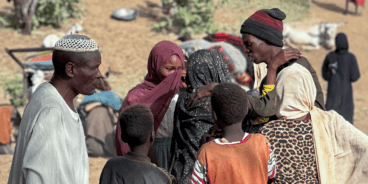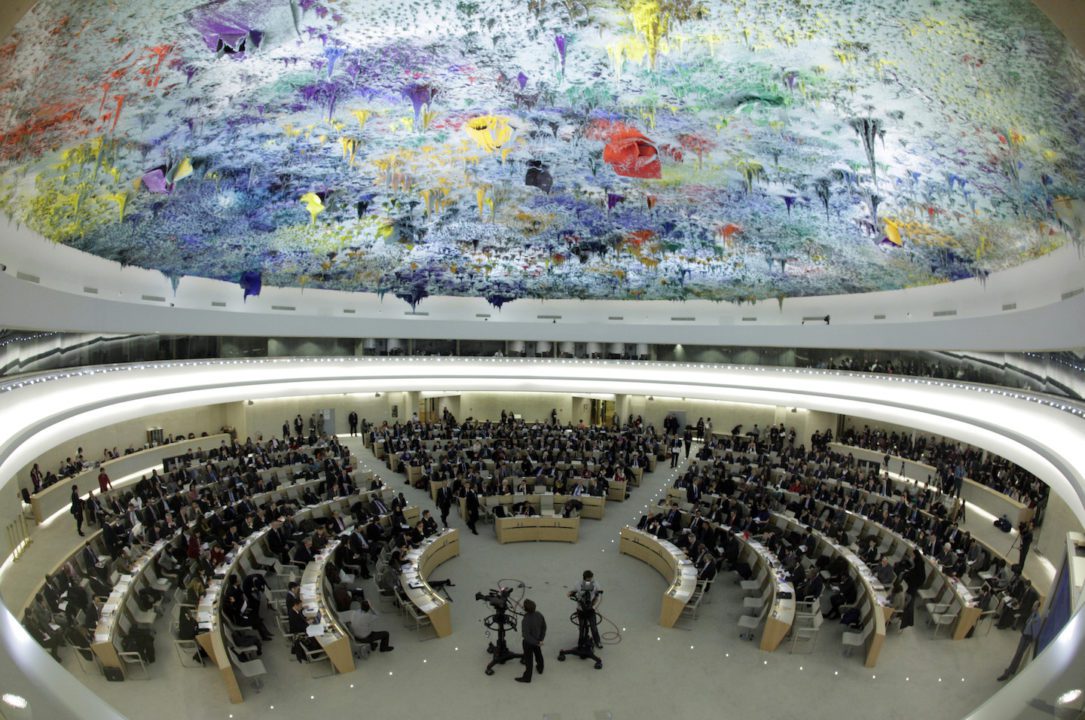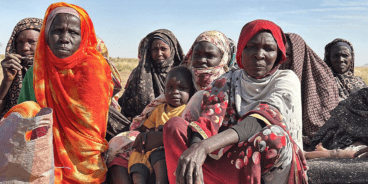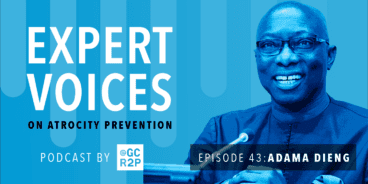

R2P and Outcomes of the Human Rights Council’s 42nd Session
The 42nd regular session of the Human Rights Council (HRC) was held in Geneva between 9 and 27 September 2019. As the primary international human rights body, the HRC has the capacity to prevent and respond to mass atrocity crimes, as systematic violations and abuses of human rights can be an indicator of potential genocide, war crimes, crimes against humanity or ethnic cleansing. The summary below highlights major outcomes from the 42nd session as they relate to the Responsibility to Protect (R2P) populations from such crimes. As part of the session, the Netherlands delivered a statement on behalf of 53 members of the Group of Friends of R2P.
RESOLUTIONS
A/HRC/42/L.4/Rev.1 Situation of human rights in the Bolivarian Republic of Venezuela
Expressing grave concern at the alarming situation of human rights in the Bolivarian Republic of Venezuela, the HRC strongly condemned widespread targeted repression and persecution on political grounds. The HRC requested the High Commissioner continue to monitor and report on the situation, including through the presentation of oral updates to the HRC at its 43rd and 45th sessions, and to prepare a comprehensive written report to be presented to the HRC at its 44th session. The HRC decided to establish, for a period of one year, an independent international Fact-Finding Mission (FFM) to investigate extrajudicial executions, enforced disappearances, arbitrary detentions and torture and other cruel, inhumane or degrading treatment since 2014, with a view to ensuring full accountability for perpetrators and justice for victims. The HRC also requested the mission to present a report on its findings to the Council during an interactive dialogue at its 45th session. The HRC decided to consider further measures, including the establishment of a Commission of Inquiry (CoI), if the situation continues to deteriorate and/or the Venezuelan authorities do not meaningfully cooperate with the Office of the High Commissioner for Human Rights (OHCHR). The resolution was adopted by a vote of 19 in favor, 7 against and 21 abstentions.
A/HRC/42/L.10/Rev.1 Situation of human rights in Burundi
Welcoming the work of the CoI on Burundi, including its recent report and analysis of the risk of atrocity crimes, the HRC deplored the persistent refusal by the government to cooperate with the CoI. The HRC called upon all parties to the electoral process to refrain from acts of violence, harassment and intimidation, and called upon the authorities to invite international and national observers to monitor the electoral process. The HRC expressed grave concern at the findings of the CoI, which documents persistent human rights violations and abuses, some of which may constitute crimes against humanity, committed by the Burundian national security forces. The HRC decided to extend the mandate of the CoI. The CoI will present a final report to the HRC during an interactive dialogue at its 45th session and to the UN General Assembly (UNGA) at its 75th session. The HRC requested the CoI to present an oral briefing to the HRC during an interactive dialogue at its 43rd and 44th sessions. The resolution was adopted by a vote of 23 in favor, 11 against and 13 abstentions.
A/HRC/42/L.12 Technical assistance and capacity-building for Yemen in the field of human rights
The HRC expressed deep concern at the serious violations and abuses of international human rights and humanitarian law in Yemen committed by all parties to the conflict, including sexual violence, continued recruitment of children, abduction of political activists, violations against journalists, killings of civilians, prevention of access for relief and humanitarian aid, persecution on the basis of religion or belief, cutting of electricity and water supplies, and attacks against hospitals and ambulances. The HRC called upon all parties to the conflict in Yemen to respect their obligations under international human rights and humanitarian law, to stop attacks on civilians and to facilitate rapid, safe and unhindered humanitarian access to affected populations nationwide. The HRC requested all parties to fully implement UN Security Council Resolution 2216 (2015) and encouraged all parties to reach a comprehensive agreement to end the conflict. The HRC requested the High Commissioner to present a written report on the implementation of technical assistance to the HRC at its 45th session. The resolution was adopted without a vote.
A/HRC/42/L.16 Human rights situation in Yemen
Condemning the ongoing violations and abuses in Yemen, the HRC called upon all parties to the conflict to respect their obligations and commitments under international human rights and humanitarian law, in particular with regard to attacks against civilians and civilian objects, and to ensure rapid, unhindered, unimpeded, sustained and safe humanitarian access to the affected population nationwide. The HRC decided to renew the mandate of the Group of Eminent International and Regional Experts on Yemen (GEE) for a period of one year and requested the GEE to present a comprehensive written report to the HRC at its 45th session, to be followed by an interactive dialogue. The HRC decided to transmit the comprehensive written report of the GEE to the UNGA and recommended that the Assembly transmit the reports to all relevant bodies of the UN. The HRC further requested the High Commissioner to present an oral update on the situation of human rights in Yemen to the HRC at its 43rd session. The resolution was adopted by a vote of 22 in favor, 12 against and 11 abstentions.
A/HRC/42/L.20 Human rights and transitional justice
Acknowledging that the fight against impunity and the implementation of transitional justice processes can prevent the recurrence of atrocities and contribute to sustainable peace and development, the HRC called upon states to develop comprehensive transitional justice strategies and establish judicial and non-judicial mechanisms to address past atrocities and the needs of victims. The HRC requested OHCHR to examine how addressing a legacy of gross violations and abuses of human rights and serious violations of International Humanitarian Law (IHL) through transitional justice measures can contribute to sustaining peace and the realization of Sustainable Development Goal 16. The HRC requested OHCHR to present a report on this matter to the HRC at its 46th session following consultations with states; relevant UN mandate holders, entities of the UN Secretariat, and agencies, funds and programs; intergovernmental organizations; national human rights institutions; non-governmental organizations and other relevant stakeholders. The resolution was adopted without a vote. The resolution recognized that “States have the primary responsibility for the promotion and protection of all human rights, including the responsibility to protect their populations from genocide, war crimes, ethnic cleansing and crimes against humanity.”
A/HRC/42/L.21/Rev.1 Situation of human rights of Rohingya Muslims and other minorities in Myanmar
The HRC urged the government of Myanmar to cooperate with and grant unrestricted access to all UN mandate holders and human rights mechanisms and stressed the need for an urgent criminal investigation into alleged crimes against humanity and war crimes in all affected territories in Myanmar. The HRC called upon the government to take concrete steps towards the creation of a conducive environment for the voluntary, safe, dignified and sustainable return of the forcibly displaced Rohingya residing in Bangladesh as well as to make efforts to eliminate statelessness, including by reviewing the 1982 Citizenship Law and ensuring equal access to full citizenship for the Rohingya and other minorities. The HRC requested the High Commissioner to follow up on the implementation of the recommendations made by the independent international FFM, including those on accountability, to continue to track progress in the situation of human rights, and to present a written report to the HRC at its 45th session and to the UNGA at its 75th session. The HRC further decided to transmit the reports of the FFM on Myanmar to the UNGA and recommends that the Assembly transmit the reports to all relevant UN bodies, and requests the Chair of the FFM to present the reports to the Assembly at its 74th session. The resolution was adopted by a vote of 37 in favor, 2 against and 7 abstentions.
A/HRC/42/L.22 The human rights situation in the Syrian Arab Republic
Recalling the statements made by the Secretary-General and the High Commissioner that crimes against humanity and war crimes are likely to have been committed in the Syrian Arab Republic, the HRC expressed its deepest concern at the most recent findings of the CoI on the Syrian Arab Republic and deplored the lack of cooperation by the Syrian authorities with the CoI. The HRC further reaffirmed the importance of establishing appropriate processes and mechanisms to achieve justice, reconciliation, truth and accountability for gross violations and abuses of international law and welcomed the steps taken by member states to prosecute the most serious crimes under international law in national courts. The HRC further invited member states to actively support the International, Impartial and Independent Mechanism to Assist in the Investigation and Prosecution of Persons Responsible for the Most Serious Crimes under International Law Committed in the Syrian Arab Republic since March 2011 (IIIM), including by considering the provision of information and data on the most serious crimes under international law, and to provide adequate financial means for its functioning, pending a decision on the necessary funding of the IIM by the regular budget, in accordance with relevant UNGA resolutions. The resolution was adopted by a vote of 27 in favor, 6 against and 13 abstentions. The resolution demanded that “the Syrian authorities meet their responsibility to protect the Syrian population” and that “the primary responsibility to protect the Syrian population lies with the Syrian authorities.”
A/HRC/42/L.26/Rev.1 Assistance to Somalia in the field of human rights
While the HRC welcomed the continued cooperation by the Federal Government of Somalia with the Independent Expert on the situation of human rights in Somalia, it expressed concern at reports of violations and abuses of human rights, including by all armed actors, and underscored the need to end impunity, uphold respect for human rights and hold accountable all those responsible for such violations and abuses. The HRC further called upon the government, with the support of the international community, to expedite the establishment of a national human rights commission, make urgent progress towards settling outstanding constitutional issues, and realize commitments to ending the prevailing culture of impunity. The HRC decided to renew the mandate of the Independent Expert on the situation of human rights in Somalia for a period of one year and to report to the HRC at its 45th session and the UNGA at its 75th session. The resolution was adopted without a vote.
A/HRC/42/L.29/Rev.1 Technical assistance and capacity building in the field of human rights for the Democratic Republic of the Congo
The HRC expressed concern about the deterioration of security conditions and respect for human rights in parts of the Democratic Republic of the Congo, particularly in the eastern provinces of Ituri and North Kivu. The HRC welcomed the establishment of a permanent human rights committee and encouraged the government to actively pursue efforts, in collaboration with civil society organizations and the international community, to put an end to the impunity of the perpetrators of serious violations of international human rights and humanitarian law. The HRC requested OHCHR provide the government with technical assistance, including necessary forensic expertise, to support judicial authorities in their investigations into allegations of violations so that their perpetrators are brought to justice, and further requested the High Commissioner to present an oral update on the human rights situation at its 43rd session. The HRC also requested the High Commissioner to prepare a comprehensive report on the situation of human rights to be submitted at its 45th session, as part of an enhanced interactive dialogue. The resolution was adopted without a vote.
A/HRC/42/L.30 Technical assistance and capacity-building to further improve human rights in the Sudan
Welcoming the formation of the Sovereign Council and the civilian-led transitional government of Sudan, as well as the signing of the constitutional document on 17 August 2019, the HRC urged the government to create a safe environment in which civil society, human rights defenders, the media and other independent actors can operate freely. The HRC encouraged the government to establish a national human rights institution that conforms to the Paris Principles. The HRC requested OHCHR to provide technical assistance and capacity-building to improve the situation of human rights in the country. The HRC further decided to renew the mandate of the Independent Expert on the situation of human rights in the Sudan for a period of either one year or on the day that an OHCHR country office is formally declared operational. On 25 September the UN High Commissioner on Human Rights and Sudan’s Minister of Foreign Affairs signed an agreement to establish an OHCHR country office in Sudan. The HRC further requested the government of Sudan and OHCHR to present oral reports on progress towards the opening of the country office during an enhanced interactive dialogue at the 44th session of the HRC. The resolution was adopted without a vote.
A/HRC/42/L.31 Technical assistance and capacity building in the field of human rights for the Central African Republic
Welcoming the signing of the Political Agreement for Peace and Reconciliation in the Central African Republic (CAR) on 6 February 2019, the HRC expressed its grave concern about the security situation in the country and condemned in particular the many acts of violence perpetrated by armed groups in violation of the Political Agreement. The HRC further stressed the urgent need to put an end to impunity in CAR and to bring to justice the perpetrators. The HRC decided to extend for a period of one year the mandate of the Independent Expert on the situation of human rights and requested the Independent Expert provide an oral update at its 44th session and to submit a further report at its 45th session. The HRC decided to organize a high-level interactive dialogue to assess the evolution of the human rights situation on the ground at its 43rd session. The resolution was adopted without a vote. The resolution recalled that “it is the primary responsibility of the Central African authorities to protect its population against genocide, war crimes, ethnic cleansing and crimes against humanity.”
A/HRC/42/L.38/Rev.1 Strengthening cooperation and technical assistance in the field of human rights in the Bolivarian Republic of Venezuela
The HRC welcomed the memorandum of understanding signed on 20 September 2019 between the High Commissioner and the Government of the Bolivarian Republic of Venezuela on the development of cooperation and technical assistance in the field of human rights through the permanent presence of OHCHR in the country and the full implementation of its mandate. Recognizing the political willingness shown by the government to cooperate with the High Commissioner and her Office, the HRC called upon the Venezuelan authorities to cooperate with the special procedures of the HRC in the fulfilment of their respective mandates, and to extend an invitation to mandate holders, as agreed upon with OHCHR. The HRC requested the High Commissioner to present an oral update to the HRC at its 43rd and 45th sessions, as well as before the end of 2019. The HRC further requested the High Commissioner present a comprehensive written report on the situation of human rights at its 44th session, including on the outcomes of the investigation into allegations of possible human right violations. The resolution was adopted by a vote of 18 in favor, 6 against and 23 abstentions.
Related Content


Joint Statement: Genocide Returns to Darfur
